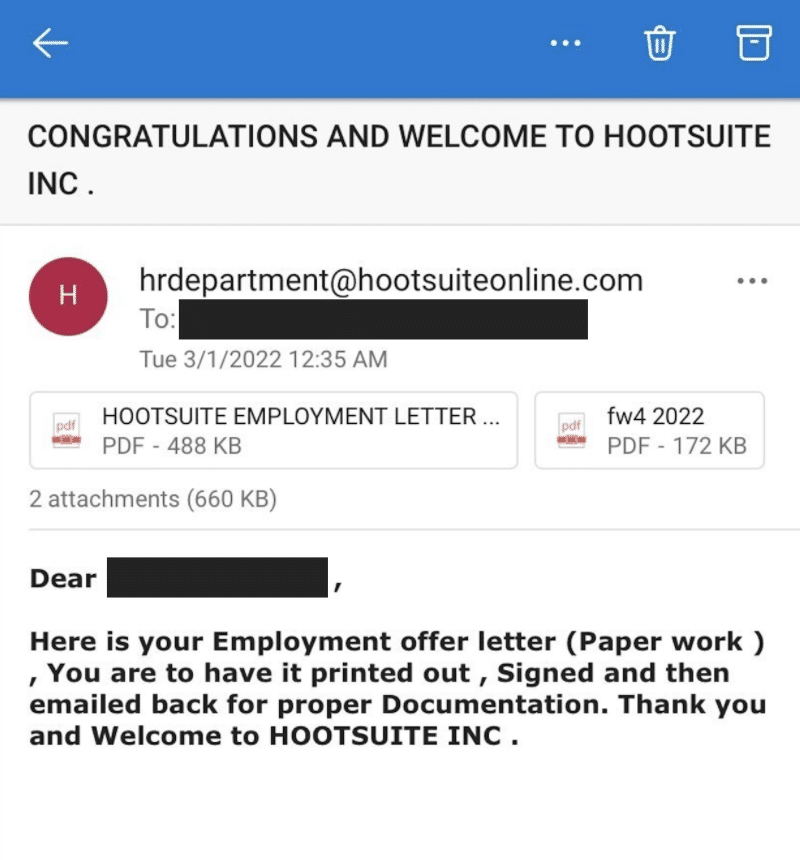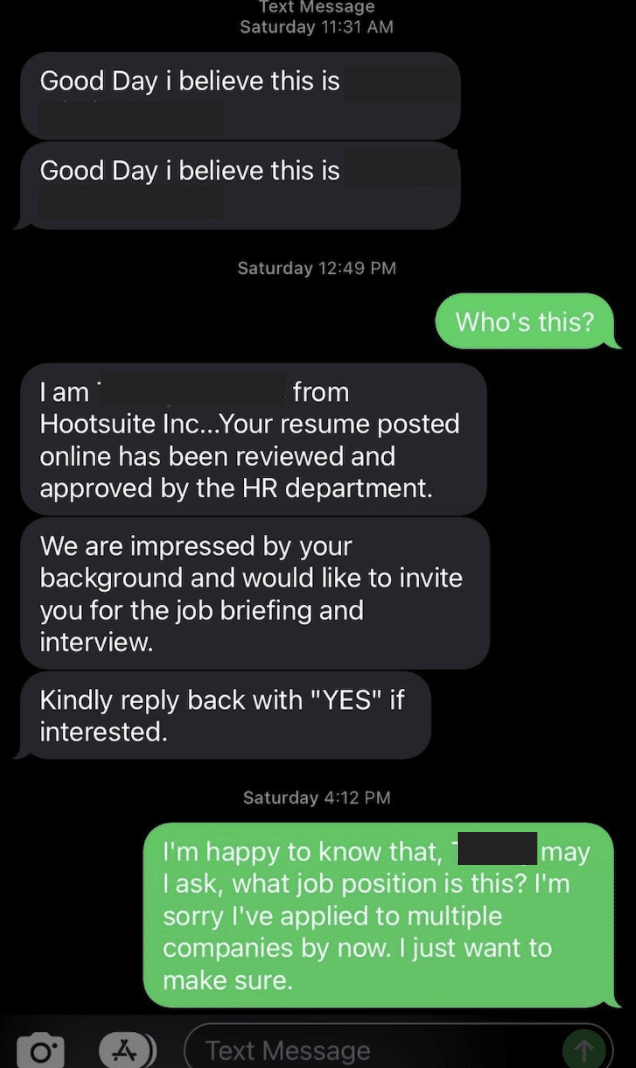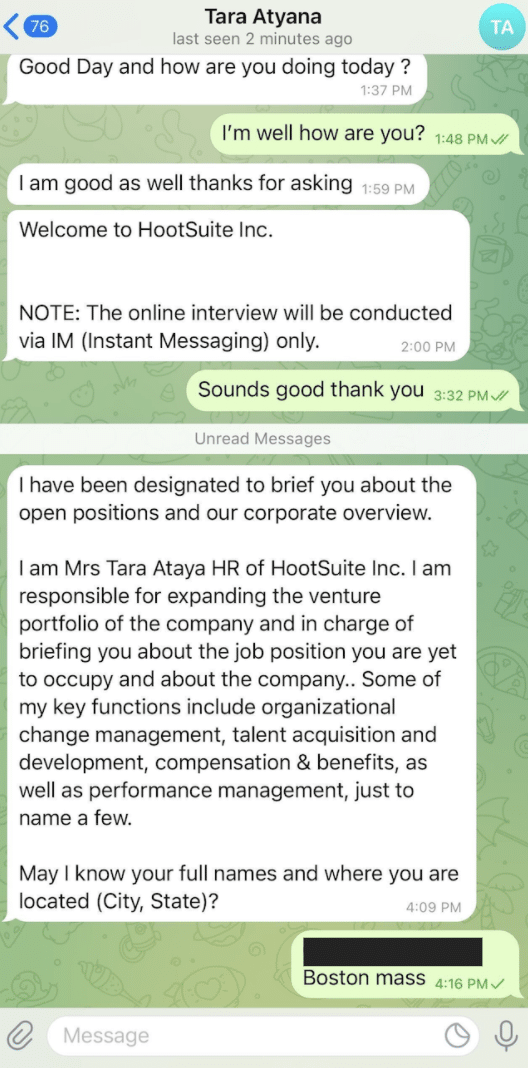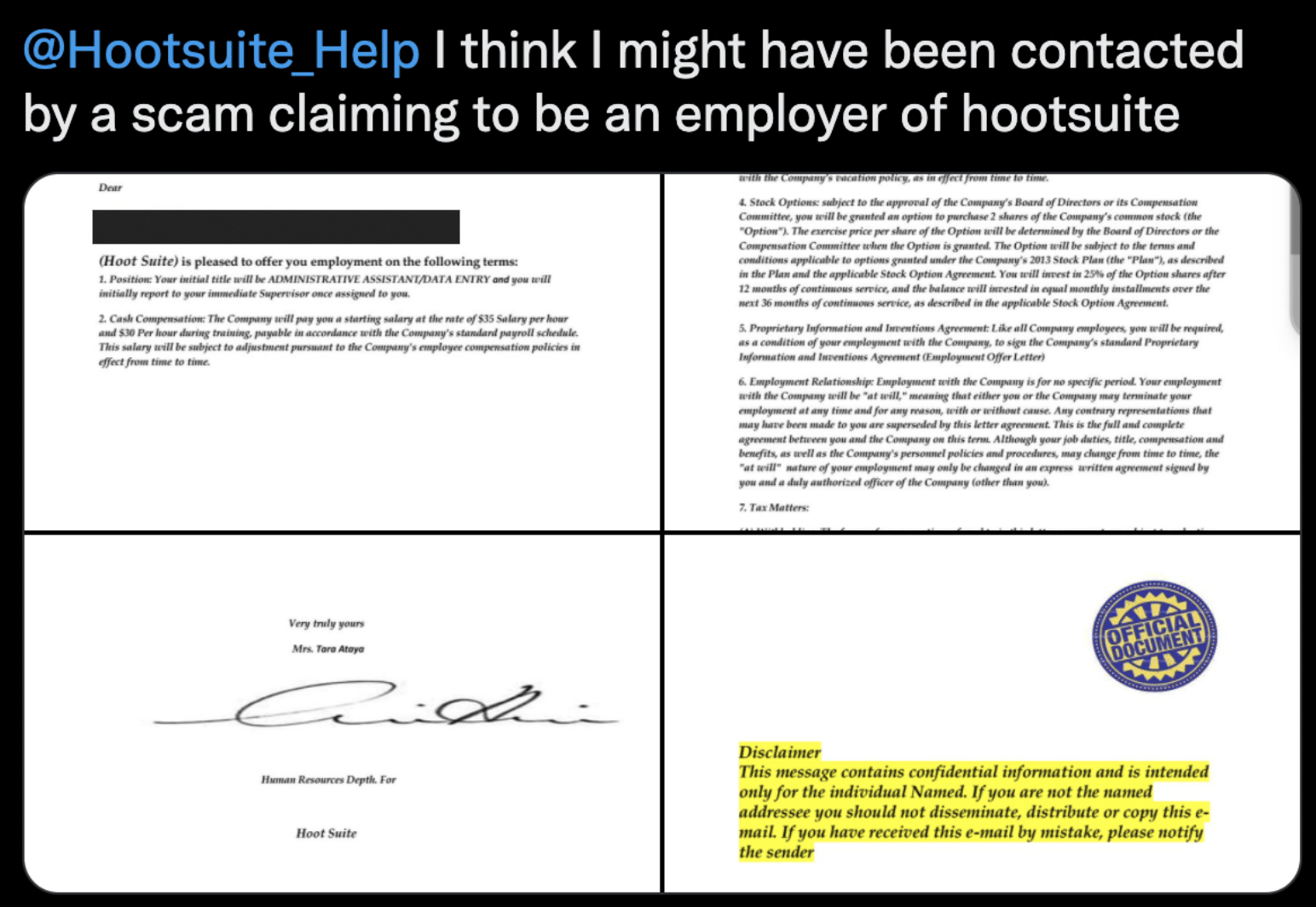HR Scams Are All Over Social—How to Make Sure That Job Offer’s Real
We’ve all received our fair share of suspicious emails and have been trained on how to spot the new generation of phishing attempts, spoofed email addresses, and inconsistencies in language and presentation.
But, do you know how to combat the HR scams that are increasingly popping up on social media?
Recruitment processes can be stressful enough at the best of times, but especially so when pandemic-induced layoffs are taking place and financial security is on the line.
Across all North American industries, 36.5% of businesses have laid off at least one employee since the start of the pandemic. In Canada, that’s led to a consistent increase in job vacancies over the last two years.
With these vulnerabilities in mind, it’s important to be well informed on the latest scam: one that’s targeting job hunters like you. Armed with information on what these recruitment impersonation scams look like, you’ll be better equipped to discern between a real recruiter and a fake one.
What are HR impersonation scams?
Impersonation scams aren’t new; they’re a tried and tested way for scammers to do what they do best: weasel their way into your pockets and get access to your valuable personal information.
The novelty of these scams is that the threat has expanded past emails and permeated into social and 1:1 messaging—mediums where scammers can impersonate corporate recruiters with ease. Real HR employees are being impersonated in fictitious job offers sent on LinkedIn, in a scheme to ultimately get targets to share confidential information.
Particularly in the tech space, HR impersonation scams have become more and more prevalent. Companies like Shopify, Google, and Amazon have all been targeted, and unfortunately, Hootsuite isn’t immune either.
Recently, we’ve had an influx of reports about scammers preying on potential candidates by impersonating Hootsuite recruiters and hiring managers.
Scammers are using Hootsuite branding on fake social media profiles to legitimize their conversations with these individuals. A few scammers were also reported to have conducted online interviews and offered jobs on behalf of Hootsuite in order to gain access to victims’ personal information such as Social Security/Social Insurance numbers, bank account info, and addresses. In some cases, they’ve even asked for payment.
Why scammers are targeting job hunters
With technology advancement and social media at everyone’s fingertips, scams are becoming more and more elaborate. But why job seekers?
The pandemic-induced Great Resignation saw 3.9 million people quit their jobs in June 2021 ALONE. And they’re not the only ones: 41% of workers worldwide admit they’re ready to leave their jobs.
With workers changing jobs at such a high rate, scammers spotted a massive potential pool of victims—and an opportunity to take advantage of hybrid working models and virtual hiring processes.
The fact that hiring candidates and new employees may not have met their colleagues in person yet makes them particularly vulnerable to these scams.
How to avoid HR scams on social media
If you’ve been actively looking for a new job opportunity, it’s hard not to get excited when a recruiter reaches out to you. Instead of tucking away that excitement, we recommend you treat the recruiter as you would anyone else sliding into your direct messages.
Nowadays, it is not uncommon for recruiters and hiring managers to reach out through LinkedIn if your profile matches a position they are looking to fill. That being said, whether you applied for a position or not, you should be extra vigilant when connecting with any recruiter on social media.
Remote jobs have created an unprecedented opportunity for HR scamming. When working remotely was less common, individuals were advised to not proceed without first meeting face-to-face with an employer. Given that this is no longer an option in many cases, do your research before proceeding—not only on the company, but the recruiter as well.
Not sure what you should be looking for? Read on to find out.
5 key signs to watch out for
Here are some top considerations to keep in mind and look out for as you navigate the hiring process for your dream job:
- A legitimate recruiter will have a well-established LinkedIn profile, with old and recent account activity, a profile picture, etc. Be skeptical of a recruiter whose profile was created only a couple days ago and who has not been very active on the platform.
- Real deal recruiters will provide you with adequate information on the role they’re reaching out about. To ensure the role is legitimate, ask the recruiter for a link to the posting on the company’s job board—and proceed with caution if there isn’t one.
- Any recruiter will keep the interaction on LinkedIn brief and request to communicate through email. Be wary of a recruiter who uses a personal email address (check for domains like Gmail, Yahoo, Hotmail, etc.). Like most established companies, Hootsuite recruiters will always use their corporate email address. Please note that the email address hrdepartment@hootsuiteonline.com does not belong to Hootsuite, and has been used to carry out these impersonations.
- If a recruiter asks to connect through an encrypted platform, such as Telegram, it’s safe to assume that they aren’t legitimate. These end-to-end encrypted platforms provide a space for scams to be carried out without a trace, making it difficult to investigate and prosecute the scammers. There are also reports of scammers asking interviewees to initiate a call using Skype. Please note that Hootsuite recruiters do not use this platform.
- Under no circumstances should you provide a recruiter with personal information (like an SSN or SIN) or any form of payment during the hiring process. If they ask for it, run.
While we take HR scams extremely seriously, we are confident that with the right tools and information in hand, you’ll be able to distinguish a legitimate Hootsuite recruiter from a scammer. If you’re unsure and want to play it safe, we recommend you reach out to talent.acquisition@hootsuite.com for reassurance and to flag potential Hootsuite impersonators.
How Hootsuite hires candidates
While we can only speak to our own hiring practices, the best way to avoid HR scams is to be aware of a company’s recruitment process. That way, you’ll be able to identify a potential scam from the very beginning, and save yourself from distress and disappointment.
At Hootsuite, our People team thoroughly reviews each applicant’s skills and competencies to ensure they match the role requirements.
Although the number of applicants varies by role, you can generally expect to hear back from our team within two weeks. Depending on the role and the number of applicants, the full interview cycle usually averages two to four weeks, but can take up to eight weeks to complete.
We recognize that it can be tricky to differentiate between a fake and a real recruiter. Hootsuite recruiters and hiring managers can reach out to you in one of two ways: through email for an application you’ve submitted or on LinkedIn for a role they believe you could be a good fit for.
Regardless of the initial contact method, you should expect the following process to take place:
- An initial phone or video call with a member of the recruitment team
- A potential second phone or video call with members of a hiring committee
- A potential third phone or video call with the hiring manager
After being assessed for the position, a Hootsuite recruiter will get in contact with you to verbally offer you the role, or to make you aware that another candidate has been selected.
If you’ve been offered the role, you can expect to receive an email from the recruiter with an official offer package for your review. We encourage all applicants to thoroughly review the package and run through any questions or concerns with our expert recruiters.
Picture this: you’ve accepted the offer and are jumping for joy!
Remember, you still don’t have to share any personal information beyond your legal name (for our recruiters to put together an official employment offer). Without exception, your full name is the only information you should have to provide to a recruiter until you have a signed and dated employment offer.
Once you’re done with the legal (and boring) part of the process, you can finally get excited about joining the Hootsuite team, and being part of an exceptional team of tech professionals!
TL;DR
When it comes to potential social scams—as with any online scheme—pausing a moment and listening to your gut can go a long way.
The Great Resignation means there are a ton of job seekers out there, which has created a breeding ground for scammers to exploit individuals.
But, no matter how elaborate the schemes get, if you focus on trusting your instincts, they have no real chance at winning. If you feel uneasy or uncomfortable while talking to a recruiter or suspect you’re being scammed, take that feeling seriously.
While we believe it’d be near impossible to imitate the experience that Hootsuite recruiters craft for our candidates, we also know there are scammers out there bold enough to try. As detailed above, our recruiters will always represent the Hootsuite brand through their email communication, social profiles, and demeanor. Under no circumstances would a Hootsuite recruiter ask for payment, confidential information, or encrypted communication.
If you have any doubts about a Hootsuite recruiter or employee, we encourage you to get in touch with us immediately at talent.acquisition@hootsuite.com.
The post HR Scams Are All Over Social—How to Make Sure That Job Offer’s Real appeared first on Social Media Marketing & Management Dashboard.
Related Posts
Categories
- 60% of the time… (1)
- A/B Testing (2)
- Ad placements (3)
- adops (4)
- adops vs sales (5)
- AdParlor 101 (43)
- adx (1)
- algorithm (1)
- Analysis (9)
- Apple (1)
- Audience (1)
- Augmented Reality (1)
- authenticity (1)
- Automation (1)
- Back to School (1)
- best practices (2)
- brand voice (1)
- branding (1)
- Build a Blog Community (12)
- Case Study (3)
- celebrate women (1)
- certification (1)
- Collections (1)
- Community (1)
- Conference News (1)
- conferences (1)
- content (1)
- content curation (1)
- content marketing (1)
- contests (1)
- Conversion Lift Test (1)
- Conversion testing (1)
- cost control (2)
- Creative (6)
- crisis (1)
- Curation (1)
- Custom Audience Targeting (4)
- Digital Advertising (2)
- Digital Marketing (6)
- DPA (1)
- Dynamic Ad Creative (1)
- dynamic product ads (1)
- E-Commerce (1)
- eCommerce (2)
- Ecosystem (1)
- email marketing (3)
- employee advocacy program (1)
- employee advocates (1)
- engineers (1)
- event marketing (1)
- event marketing strategy (1)
- events (1)
- Experiments (21)
- F8 (2)
- Facebook (64)
- Facebook Ad Split Testing (1)
- facebook ads (18)
- Facebook Ads How To (1)
- Facebook Advertising (30)
- Facebook Audience Network (1)
- Facebook Creative Platform Partners (1)
- facebook marketing (1)
- Facebook Marketing Partners (2)
- Facebook Optimizations (1)
- Facebook Posts (1)
- facebook stories (1)
- Facebook Updates (2)
- Facebook Video Ads (1)
- Facebook Watch (1)
- fbf (11)
- first impression takeover (5)
- fito (5)
- Fluent (1)
- Get Started With Wix Blog (1)
- Google (9)
- Google Ad Products (5)
- Google Analytics (1)
- Guest Post (1)
- Guides (32)
- Halloween (1)
- holiday marketing (1)
- Holiday Season Advertising (7)
- Holiday Shopping Season (4)
- Holiday Video Ads (1)
- holidays (4)
- Hootsuite How-To (3)
- Hootsuite Life (1)
- how to (5)
- How to get Instagram followers (1)
- How to get more Instagram followers (1)
- i don't understand a single thing he is or has been saying (1)
- if you need any proof that we're all just making it up (2)
- Incrementality (1)
- influencer marketing (1)
- Infographic (1)
- Instagram (39)
- Instagram Ads (11)
- Instagram advertising (8)
- Instagram best practices (1)
- Instagram followers (1)
- Instagram Partner (1)
- Instagram Stories (2)
- Instagram tips (1)
- Instagram Video Ads (2)
- invite (1)
- Landing Page (1)
- link shorteners (1)
- LinkedIn (22)
- LinkedIn Ads (2)
- LinkedIn Advertising (2)
- LinkedIn Stats (1)
- LinkedIn Targeting (5)
- Linkedin Usage (1)
- List (1)
- listening (2)
- Lists (3)
- Livestreaming (1)
- look no further than the new yorker store (2)
- lunch (1)
- Mac (1)
- macOS (1)
- Marketing to Millennials (2)
- mental health (1)
- metaverse (1)
- Mobile App Marketing (3)
- Monetizing Pinterest (2)
- Monetizing Social Media (2)
- Monthly Updates (10)
- Mothers Day (1)
- movies for social media managers (1)
- new releases (11)
- News (72)
- News & Events (13)
- no one knows what they're doing (2)
- OnlineShopping (2)
- or ari paparo (1)
- owly shortener (1)
- Paid Media (2)
- People-Based Marketing (3)
- performance marketing (5)
- Pinterest (34)
- Pinterest Ads (11)
- Pinterest Advertising (8)
- Pinterest how to (1)
- Pinterest Tag helper (5)
- Pinterest Targeting (6)
- platform health (1)
- Platform Updates (8)
- Press Release (2)
- product catalog (1)
- Productivity (10)
- Programmatic (3)
- quick work (1)
- Reddit (3)
- Reporting (1)
- Resources (34)
- ROI (1)
- rules (1)
- Seamless shopping (1)
- share of voice (1)
- Shoppable ads (4)
- Skills (28)
- SMB (1)
- SnapChat (28)
- SnapChat Ads (8)
- SnapChat Advertising (5)
- Social (169)
- social ads (1)
- Social Advertising (14)
- social customer service (1)
- Social Fresh Tips (1)
- Social Media (5)
- social media automation (1)
- social media content calendar (1)
- social media for events (1)
- social media management (2)
- Social Media Marketing (49)
- social media monitoring (1)
- Social Media News (4)
- social media statistics (1)
- social media tracking in google analytics (1)
- social media tutorial (2)
- Social Toolkit Podcast (1)
- Social Video (5)
- stories (1)
- Strategy (608)
- terms (1)
- Testing (2)
- there are times ive found myself talking to ari and even though none of the words he is using are new to me (1)
- they've done studies (1)
- this is also true of anytime i have to talk to developers (1)
- tiktok (8)
- tools (1)
- Topics & Trends (3)
- Trend (12)
- Twitter (15)
- Twitter Ads (5)
- Twitter Advertising (4)
- Uncategorised (9)
- Uncategorized (13)
- url shortener (1)
- url shorteners (1)
- vendor (2)
- video (10)
- Video Ads (7)
- Video Advertising (8)
- virtual conference (1)
- we're all just throwing mountains of shit at the wall and hoping the parts that stick don't smell too bad (2)
- web3 (1)
- where you can buy a baby onesie of a dog asking god for his testicles on it (2)
- yes i understand VAST and VPAID (1)
- yes that's the extent of the things i understand (1)
- YouTube (13)
- YouTube Ads (4)
- YouTube Advertising (9)
- YouTube Video Advertising (5)




